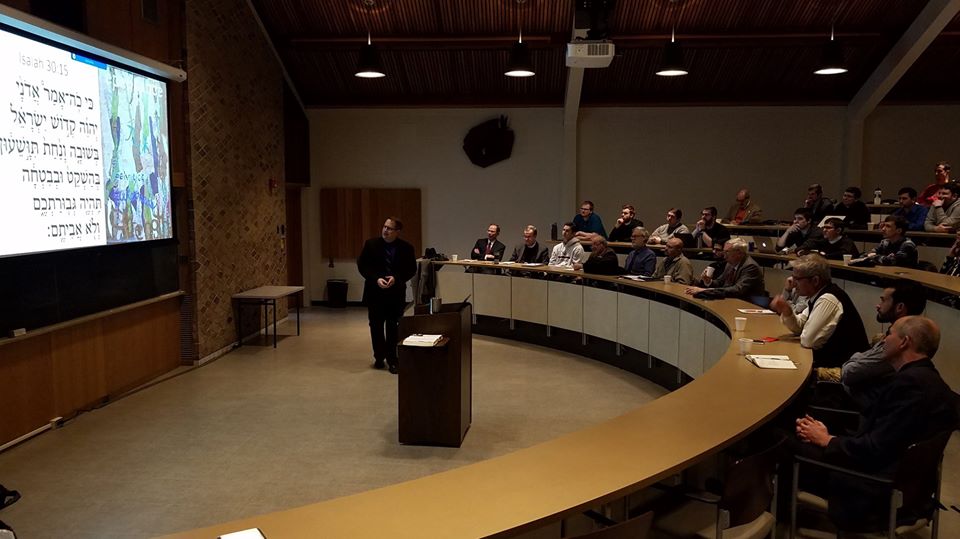
Wednesday’s convocation featured Dr. Ryan Tietz, Assistant Professor of Exegetical Theology, who earned his PhD this fall. His presention, “Wait for It: Isaiah 30 as Mirror Text of the Book of Isaiah,” was based on the themes he explored in his dissertation.
“Isaiah chapter 30 is the Nebraska of the book,” Dr. Tietz began (who earned his B.A. from Concordia Nebraska before going to seminary). “It’s flyover country. It doesn’t look like much, and hasn’t had much of an impact on the Church, but when you look closer you discover its complexity. You find yourself reading through this great mosaic of images that reflects the tension throughout the book of Isaiah.”
The book of Isaiah weaves together several motifs: human rebellion, that God will restore His children, but that He will give the rebellious sons what they want and delay salvation. Isaiah 30 acts as a summary statement for all these themes.
Both chapter 1 and chapter 30 of Isaiah start with the charge of rebellious sons—“Which is a big deal,” Dr. Tietz explained. “It’s a capital offense in Deuteronomy. God has already done everything required to be a good father, but they’ve failed in their obligations. ‘You are dead to me. Go play in traffic.’”
The tragedy is that they get what they want. The mission hymn “Hark, the Voice of Jesus Calling” uses the line, “Here am I, send me, send me,” from Isaiah 6:8, but does not capture the verse that follows: “And he said, ‘Go, and say to this people: ‘Keep on hearing, but do not understand; keep on seeing, but do not perceive’” (Is. 6:9). Isaiah’s mission from God is to blind them lest they see with their eyes. His mission is to give the rebellious sons what they want, lest they turn and be healed.
We see it again in chapter 30, verse 10, when God speaks of the lying children “who say to the seers, ‘Do not see,’ and to the prophets, ‘Do not prophesy to us what is right.’” Basically: “Stop having an involuntary vision!”
“It’s absurd,” Dr. Tietz said. “That’s what it means to be rebellious. Verses 9–11 paint a picture of a people who are willfully ignorant.”
But then always comes the reversal. In 30:18: “Therefore the Lord waits to be gracious to you,” and an even more pointed counterpoint to verse 10 comes a couple of chapters later in 35:5: “Then the eyes of the blind shall be opened, and the ears of the deaf unstopped.”
This constant ebbing and flowing of the tension remains even to the final verse of the book (66:24): “And they shall go out and look on the dead bodies of the men who have rebelled against me. For their worm shall not die, their fire shall not be quenched, and they shall be an abhorrence to all flesh.”
“Go back to verse 23 to feel better,” Dr. Tietz recommended.
Isaiah 30:18 epitomizes the tension of waiting that is at the heart of the book. It is the summary statement of the book of Isaiah: that salvation isn’t about doing anything—it’s returning to rest. Trust Yahweh, trust Yahweh.
“Therefore the LORD waits to be gracious to you,
and therefore he exalts himself to show mercy to you.
For the LORD is a God of justice;
blessed are all those who wait for him.”
Dr. Tietz’s dissertation, “The Delayed Eschatological Vision: The Theological and Hermeneutical Function of Isaiah 30” ultimately tipped the scales at 246 pages. “It’s a heavy weight,” he admitted, “but there’s always more to be done, more to be discovered.” For those who would like to learn more, Dr. Tietz has submitted his thesis to www.proquest.com, a database of dissertations. It is not yet available, but should be soon.
